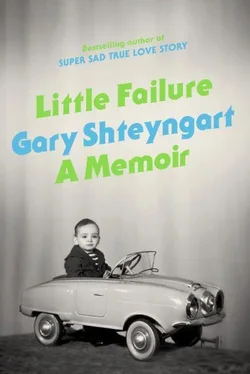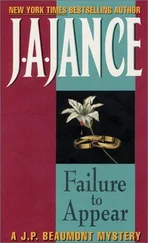
My college roommate C-cup Irv and his parents live in Washington Square Village, two pieces of colorful NYU Warsaw Pact architecture set around a pleasant private park. Across the hall from Irv lives a sound editor who is friends with the former head writer of the soap opera As the World Turns . I want to say this soap opera writer, John, is x years old, but in the two decades I’ve known him he has never revealed his age. It’s not that he lies about it. It’s that he does not confess his age to anyone . “Too traumatic,” he whispers when asked, his face folding into a sort of grieving Jewish turtle expression, the kind my people reserve only for talk of their own extinction. In his apartment, I once found a college graduation photograph, which had John’s graduation date written on the back. He lunged across the room to grab the photo from me, demolishing a coffee table in the process, then yelping in pain on the floor while triumphantly holding on to the graduation photo. So how old is John? Since you can never really tell the age of Americans who lumber toward nonbeing on their own schedules, let’s just say that when I first meet him in 1993, he is old enough for me to turn him into a parental figure and young enough for me to understand him as a friend.
In 1993 John has left the soap opera world and is writing a script about a college-aged kid who kills his parents. (Vaguely appropriate, given that at the time I am trying to kill my own parents, or at least the first twenty years of my life spent with them.) His friend, the sound editor, suggests a suitable candidate from my generation. Enter Oberlin roommate Irv, the proud sexual omnivore and keeper of Big Blue, our three-foot bong. Enter Maya (name changed), a sweet, damaged round girl who is a dominatrix in the Vault, New York’s premier sadomasochist club, whom I will also pluck from life and pin, with a modicum of blood spilled, onto the pages of my burgeoning first novel under the name Challah.
Enter me.
John invites me out. I am so impressed to be meeting a real writer I tell John I will gladly pay for dinner. I take him to a fancy Indian place called Akbar on Park Avenue and Fifty-Ninth, where Paulie, my lecherous high school boss, used to take me. The restaurant has stained-glass ceilings that dazzle my Little Neck eye, and the waiters seem very proud of their powerful tandoor oven, from which emerges my very first pillowy naan bread, the steam rising magically around my fingers as I tear it apart.
I do not realize that this is the last fancy meal I will pay for in the next five years, nor that I am about to turn in one benefactor for another, this one without the urge to bend me over his desk. The writer Chang-rae Lee (about whom later) will remark that my characters are usually sons in search of fathers. It would be hard for me to argue his point.
At dinner, I am looking at a balding, curly-haired man in wire-rimmed glasses, part of his face hidden beneath a bushy mustache, his crisp Frank Stella shirt tucked into his denims. This is how I picture the cool, high-end fathers of Oberlin students who live in off-campus houses with funny names like Banana House or Eek-a-House! where everyone is in a band or very close to someone in a band.
Here is what John sees seated before him at Akbar. A twenty-year-old boy with scraggly, ass-length hair, outrageous, sparse Soviet teeth that would not flatter an Appalachian beaver (until my parents replace them in a year, I speak with a hand constantly held in front of my mouth, like a shy Japanese girl), and the pride of my wardrobe, a silk summer jacket, the kind worn by the actor Don Johnson in the TV serial Miami Vice , which I also wear with the sleeves partially rolled up, even during the month of January.
John takes all this uniqueness with good cheer, as my orthodontia and I question him about the writing life — I am particularly impressed that he has written for Knots Landing , a spin-off of my beloved Dallas . I have sent him some of my work from Oberlin, in particular a short play, which he has marked with encouragement (“funny,” “good passage”) and precise criticism (“get specific,” “awkward phrase”). At dinner, I am full of follow-up questions. How may I best fix this awkward phrase? What does getting more specific mean?
John is a Manhattanite through and through, as complicated and as rooted in place as anyone I’ve ever met, versed in restaurants and theaters and a market called Fairway, on Broadway at Seventy-Fourth Street, which stocks foods such as I could have only imagined: lemon anchovies, Roman artichokes, Idiazabal cheese from the Basque country. He also has no children, which is fortuitous for me but perhaps not so much for him.
Within a few months of our Akbar dinner, the Don Johnson jacket will be gone, traded in for one of John’s old Armani blazers.
Within a few months, we will be on the phone almost daily, me pressing him on the latest draft of a story or a poem with bratty impatience, as if his entire world revolves around my creative needs. “Have you read it? John? Hello? I cannot wait any lon- ger. Talk to me, Haimosaurus!” (John is not tall, but there is something colossal yet haimish about his presence and gait, reminding me of a powerful Hebraic dinosaur.)
Within a few months, I think seriously of transferring to Columbia or, more in tune with academic reality, NYU, to be closer to my new role model. Only my budding relationship with J.Z. will keep me at Oberlin.
Within a few months, John will take me, J.Z., and roommate Irv out to the River Café for my twenty-first birthday, and I will run off with my girlfriend to the parking lot to kiss her in front of the world’s most important skyline for at least as long as it takes a medium-rare filet mignon to grow cold.
Within a few months, J.Z. and I will be staying in his empty new apartment, sleeping together on his bare hardwood floors.
Within a few months, he will drop the idea of his script and start making a documentary film about me, Irv, and Maya the Dominatrix, which will eventually be titled Only Children , because he and his three subjects share an interesting quirk — a paucity of siblings.
And within a few years, I will drive him completely and conclusively around the bend. And he, in turn, will deposit me in front of the New York Psychoanalytic Institute.

John figures out that I’m a jerk pretty quickly. It happens while he’s filming a dinner with me, Irv, and his parents at their Washington Square Village pad. I love Irv’s apartment unreservedly, because it is at the center of the island where I want to live and because the laws of parenting, as I have known them, do not apply around here. There are garbage cans perched on shelves for no good reason, and most of the belongings are stuffed into bulging bags from the Duane Reade pharmacy. “You’re supposed to be the adult!” Irv’s mother yells at John, banging on his bedroom door. The three of us are huddled together, puffing reefer, a towel stuffed under the door Irv’s mama is trying to demolish. Irv, hurriedly putting out the joint: “Just a minute, Mom! We’re working .” And then we all laugh, mother included, at John’s lack of adulthood. Back in the living room, John shows us some footage of Maya the Dominatrix, whom he, in his infinite sympathy, is about to install in her own apartment, as she’s about to go homeless.
And I let loose. From behind my Russian rabbit teeth, a torrent of hatred so misdirected at a girl whose life is sliding off the rails, who has done me no harm, who is closer to me than I think. She’s fat. Suburban. Unsophisticated . This from a boy who has just scribbled “Aubusson” into his writer’s journal and underlined it no fewer than thrice.
Читать дальше













